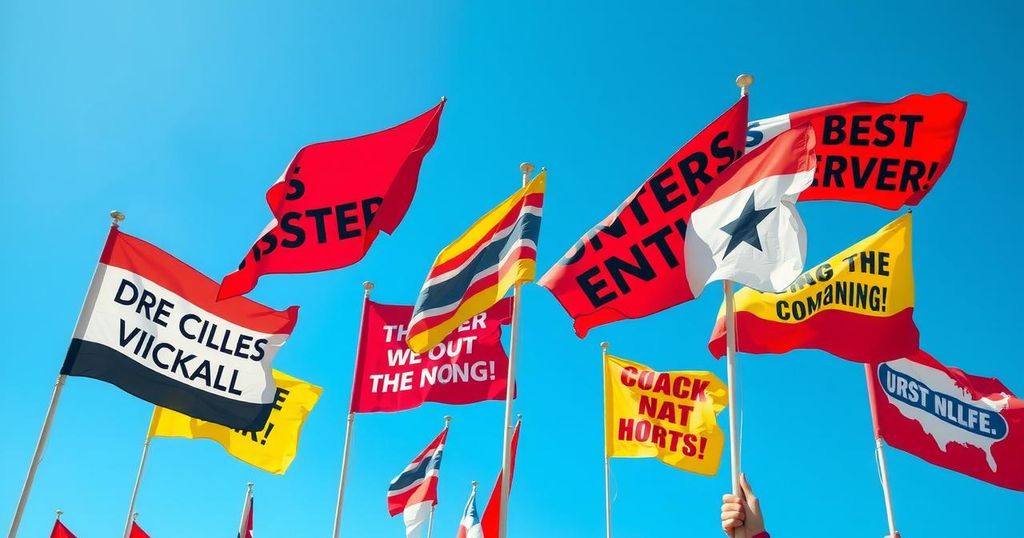The U.S. and Israel are exploring Somaliland as a potential relocation site for Palestinians from Gaza under Trump’s controversial plan. Somaliland, seeking recognition as an independent state, may see this as an opportunity. However, strong local support for Palestine and opposition from Somali officials could hinder the proposal. Concurrently, Somalia faces internal political strife, reaffirming its pro-Palestinian stance amidst challenges from extremist groups.
The United States and Israel are allegedly considering the Horn of Africa as a potential site for relocating Palestinians displaced from Gaza, focusing particularly on Somaliland. An Associated Press report from March 14 revealed that American and Israeli officials are engaging in discreet discussions with both Somalia and Somaliland, exploiting the longstanding rivalry between the two to advance this controversial plan.
Somaliland has long sought international recognition as an independent state, presenting itself as a stable alternative in an otherwise violent Somalia. In 2022, it offered military access to a vital seaport and airfield in exchange for progress towards sovereignty. Now, there is speculation that this plan may present Somaliland with the opportunity to gain recognition from the United States.
Former President Trump’s proposal entails the permanent relocation of the 2.3 million residents of Gaza, with the U.S. assuming administrative control to transform the area into a high-end real estate project. This idea aligns with far-right factions in Israel, who have long supported the expulsion of Palestinians from their homeland, envisioning this approach as a practical solution to the ongoing conflict.
To implement this scheme, the United States and Israel are reportedly orchestrating a combination of financial, diplomatic, and security incentives to motivate Somaliland and other partners, akin to the Abraham Accords which normalized relations between Israel and several Arab nations. However, a surge of pro-Palestine sentiment following the recent conflict has created a less favorable environment for such initiatives.
Moustafa Ahmad, a researcher based in Somaliland, expressed skepticism regarding the feasibility of Trump’s plan. He emphasized that public support for Palestine could make any attempts at resettlement extremely contentious, especially since even key U.S. allies like Egypt, Jordan, and Saudi Arabia have rejected similar proposals.
The United Arab Emirates, a supporter of Somaliland’s recognition bid and a partner of Israel, may play a crucial role in facilitating negotiations. However, although the UAE has not condemned Israel strongly, it supports Egypt’s reconstruction proposal for Gaza, which contradicts the resettlement plan proposed by Trump.
Somaliland’s President, Abdirahman Mohamed Abdullahi “Irro,” refuted claims of ongoing negotiations, clarifying that any discussions with the U.S. would only be assessed once a formal proposal was made. Meanwhile, in Somalia, a separate political crisis is unfolding; President Hassan Sheikh Mohamud’s controversial amendments have led Puntland, an autonomous region, to withdraw recognition of the federal government, effectively declaring independence.
As Puntland’s decision exacerbates divisions in Somalia, the al-Shabaab militant group has capitalized on the chaos, launching attacks that further destabilize the security situation. Although Washington has potential leverage, Somali officials have reiterated their refusal to accept any plan that involves displacing Palestinians.
Somalia’s Foreign Minister, Ahmed Moalim Fiqi, expressed his government’s unwavering support for Palestinian sovereignty, emphasizing that Somalia would not sanction the resettlement of other populations. In recent years, Somalia’s close ties with Arab nations and Turkey have reinforced its pro-Palestinian stance, as reflected in resolutions from the Arab League, which firmly rejected Trump’s proposal.
Moustafa Ahmad noted that extremist groups in Somalia have historically linked their narratives to the Palestinian struggle, reinforcing a sense of Islamic solidarity. Given the substantial influence of al-Shabaab in Somali territories and prevalent pro-Palestinian sentiment, Mogadishu is unlikely to jeopardize its fragile stability by entertaining proposals that may lead to further discord.
In summary, discussions regarding the potential for relocating Gaza’s Palestinians to Somaliland have sparked significant discontent within the region. While Somaliland seeks international recognition, the plan faces skepticism from local leadership and the public, emphasizing strong support for the Palestinian cause. Somalia remains staunchly against enabling such a displacement strategy, reinforcing its solidarity with Palestine amid ongoing internal political turmoil and external pressures, particularly from extremist groups. The current environment poses considerable challenges for any prospective U.S. initiatives.
Original Source: www.newarab.com






